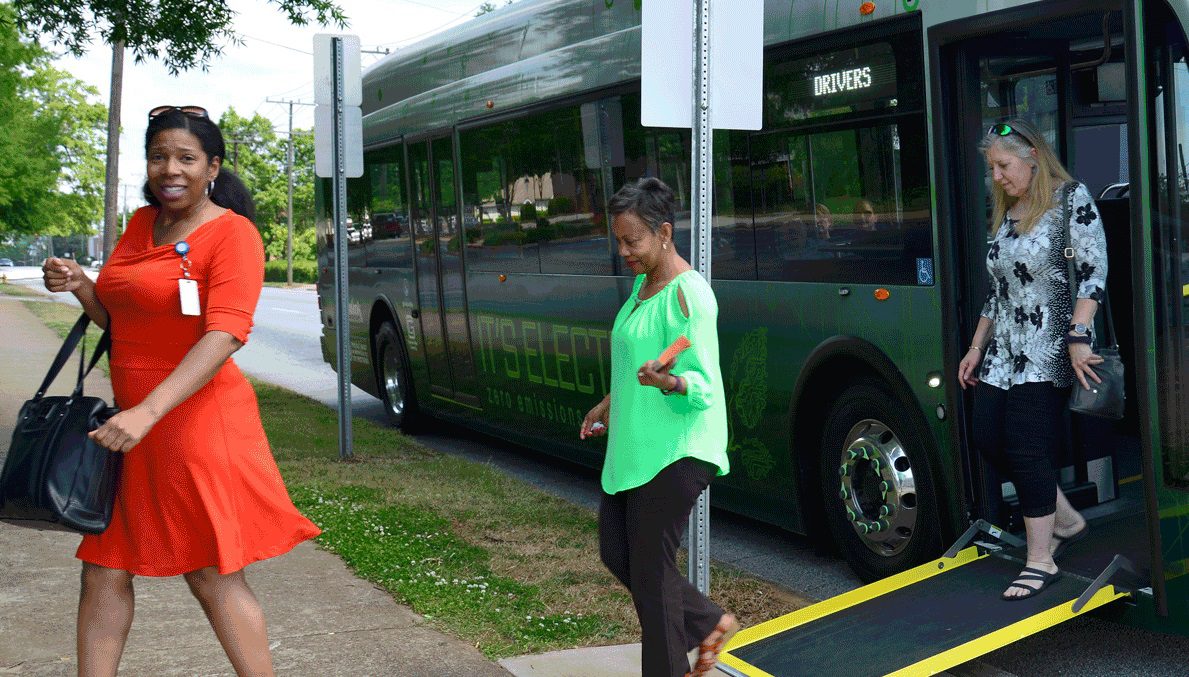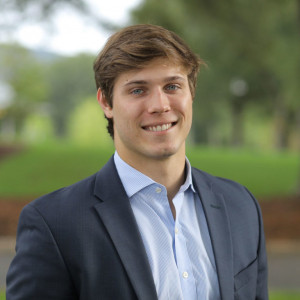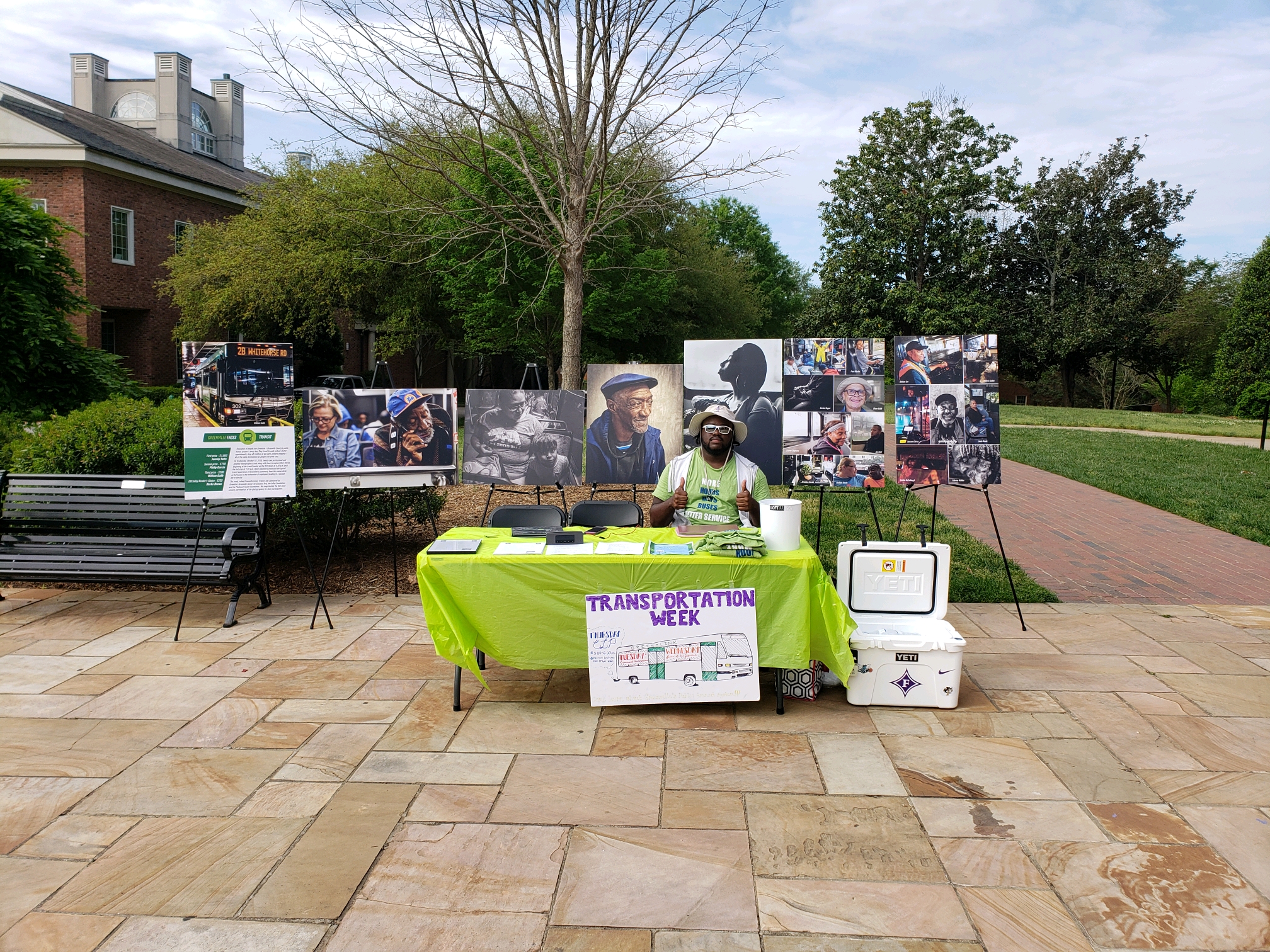Greenlink funding could see big jump thanks in part to IACH advocacy

Greenville County and the City of Greenville are on the verge of making an unprecedented investment in public transportation. For the thousands of riders who depend on Greenlink buses to get to and from work, the doctor’s office or the grocery store, that’s life-changing good news.
For Sean Rusnak ’18, a Health Policy Post Baccalaureate Fellow at Furman’s Institute for the Advancement of Community Health (IACH), it’s as a successful an outcome as he could have hoped for after more than a year of advocacy.

Sean Rusnak ’18 is a Health Policy Post Baccalaureate Fellow at Furman’s Institute for the Advancement of Community Health.
“There was applause and cheering when they announced the money. We’re ecstatic,” he said. “That was a great gift by the county and more than enough to get Greenlink working on the project that it proposed.”
If the final Greenville County budget is approved on June 28, funding for Greenlink will jump from just under $500,000 a year to $2.5 million, enabling buses which currently stop running at 7:30 p.m. to keep moving until 11:30 p.m. Those extra hours would allow riders to get to third-shift jobs or home from second-shift jobs.
Rusnak is a Greenville native who graduated with degrees in public health and political science, and while he was aware that public transportation was a low priority for local government he was shocked to discover just how low until he dug into the numbers.
“When you look at what we invest per capita in the service area it’s $3. The next-lowest was $17, in Charleston,” Rusnak said. “We spend 10 times more on animal control in Greenville than we do on our transit system, so that’s something this institute has really rallied around.”
The IACH works closely with a variety of community partners to advance education and research devoted to supporting and improving health. One partner is the Piedmont Health Foundation, where Rusnak helped identify lack of access to transportation as a significant need in Greenville while interning as a Furman student.
Moving to the IACH allowed him to try to do something about it. As a nonprofit, the Piedmont Health Foundation can’t lobby for specific legislation. A coalition of local organizations and businesses, called Greenville Connects, could.
“Through this group we’ve kind of gently behind the scenes been trying to nudge county council into funding Greenlink a little more appropriately,” he said.
Rusnak also used Furman as a resource, reaching out to Dana Professor of Politics and International Affairs Glen Halva-Neubauer, his former advisor. The result was a collaboration with Halva-Neubauer’s urban politics class in the spring, where 10 students satisfied their requirement for urban advocacy by helping with the Greenlink project.
“Those students rode the buses and collected people’s stories so that they could become better advocates and understand what’s happening on the buses, and then they translated that into coming back onto campus and letting people know how important that is,” Rusnak said. “We did a transit awareness week, where they educated people on the issues, hosted a CLP, and conducted surveys asking people what it would take to get them to ride the buses.”
Students also showed up at county council meetings while the funding was being debated, making their position clear with matching green T-shirts. Figuring out which buttons to push and how was one of the most valuable things they learned, Rusnak said. In Greenville, that means recruiting business and religious organizations to your cause.
“They learned how crazy politics is and all the things that go into it, and they understand the stream of influence. That’s something we had a very frank conversation about,” Rusnak said. “County council does not care about me. If they have any concept of millennials, it’s that we don’t vote, so they don’t really have to entertain our opinion. So how can we as consumers, as Furman students, influence influencers?”
Greenville Chamber of Commerce Senior Vice President Jason Zacher said the work Furman did humanizing bus riders was invaluable when talking to members of the County Council.
“The Greenville Chamber is very concerned about breaking down workforce barriers … Furman has been very helpful in trying to help us engage with these things,” he said. “It’s much harder making a case asking for funding for something like this when you don’t have direct knowledge of it. What they were able to do for us was help put a face to the need and really help give a voice to some of these people who rely on transit on a daily basis.”
Rusnak hopes this is just the first step in making Greenlink a much more useful part of the community. Continued increases in funding would allow more routes, more buses and more frequent stops – which could increase ridership by Furman students and employees, many of whom don’t have cars or simply would prefer not to drive them all the time.
Betsy Rice ’20 was one of the students who worked on the project. Surveys taken during the “Transit Awareness Week” they organized in April found that 75 percent of students would use Greenlink if it were more convenient. Currently, the only Greenlink stop on campus is just outside the front gate.
“If it would pick me up at a reliable time in front of my dorm and take me to my internship downtown, heck, yeah (I would ride the bus),” Rice said. “I think a lot of Furman students would, because a lot of students come from outside of Greenville where public transit is better.”
Zacher was impressed by the dedication of the Furman students.
“What’s interesting has been their willingness to jump in to assist the community and really try to make Greenville a better place,” he said. “Even students who may not be from Greenville are diving in to try to help, and I think that’s a wonderful testament to what (Furman is) building up there.”

Jordan Harris ’20, an urban studies and politics and international affairs major who took Furman’s urban politics class in the spring, sits at a table outside the James B. Duke Library during April’s “Transit Awareness Week.” On the boards behind him are pictures students took of people riding Greenlink buses.